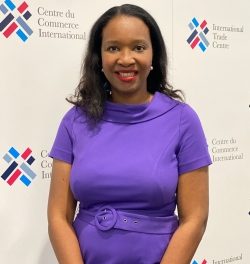
To unlock African women’s potential, we must end gendered patterns of labour

By Ekemini Akpakpan
Fundraising & Communications Consultant, Paper Crown Rwanda.
COVID-19 has shown the urgent need to reimagine our world – and more critically, to reimagine it for women. It has exposed the vulnerabilities of livelihoods and persistent inequalities affecting women in the context of the African workforce.
In Africa, women are disproportionately employed in the informal economy in small-scale food processing, subsistence farming and petty food trading, suffering poor working conditions and living standards as a result. The lack of power willed by women in these sectors – because they are functioning primarily in gendered roles, and still grappling with barriers like unfair land laws and poor access in the food supply chain – puts them at a considerable disadvantage.
These vulnerabilities call for urgent examination of investment in women’s human capital, in order to realize their potential in the workforce and economy in Africa. The human development approach focuses on advancing human well-being by enriching people, rather than the economy. The focus on creation of opportunities for people to live lives they value, and provision of an enabling environment for people to make choices, will be what allows African women to realize their full potential in a post-COVID-19 world.
Breaking down gender segregation
Gendered patterns of division of labour have already reduced the scope of women’s economic participation across Africa. Despite that the educational attainment gender gap is nearly closed, this has not translated into new opportunities in the job market for African women. They are mostly placed in service-sector roles like hairdressing, fashion retail and food catering.
The pandemic further exposed the underpinning gender-socialization constructs, starting with the fact of women’s heavier burden of care-giving during this difficult time. Shouldering more domestic work also exacerbates their poor well-being and working conditions. Job losses hit African women disproportionately hard during the crisis, with widespread technology adoption in the customer care and administrative roles they predominantly occupy. The impact has been even harder on the ageing female population, who lack the relevant skills to reinvent their careers.
During the pandemic, there was some anecdotal evidence of new opportunities opening up for women in food and agriculture. A Niger Delta study in Nigeria suggested women were better positioned to support their families as key actors in the food and agricultural sector, at a time when their spouses’ income in the oil and gas sector declined during the pandemic.
But women’s lack of capability to transform this sector is reinforcing their lack of economic resilience in the longer term. For instance, women in the informal economy are yet to explore technological possibilities in food retail, transforming raw materials to finished food products, meeting standardized food packaging and export practices, and building structured food and agricultural businesses.
The fact that gender roles are cast in stone, and repetitive across generations, limit prospects for women’s career growth. Such preconceptions influence women’s perceived value in the workforce, instead of liberating their full potential. It does not let them demonstrate higher skills like independent thinking, autonomy and critical-thinking skills. Understating the value of women in this way continues to promote their use as unskilled labour.
In order to improve their participation, there is a need to promote agency and self-awareness among women and girls. Becoming aware of their potential and capacity for decision-making will lead to better professional outcomes. They will be able to better take advantage of shifts such as the one that occurred during the pandemic – described by Proshare in the financial sector as “a shift in the strategic deployment of human resources industry-wide by banks”. Women reskilling is vital to position themselves for opportunities in a volatile, uncertain, complex, ambiguous world.
The power of choice
According to UNDP: “The process of human development seeks to create an environment for people, individually and collectively, to develop to their full potential and to have a reasonable chance of leading productive and creative lives that they value.” Business and educational institutions play a key role in the realization of this potential for women in the workforce. The latest Global Gender Gap report recommends that for the future of women’s economic opportunities: “Policies and practices need to proactively focus on overcoming occupational segregation by gender.”
For instance, Women in Successful Careers (WISCAR) in Nigeria is an example of an organization that fosters women’s career advancement opportunities through role modelling. As a mentee of the WISCAR Mentoring Program, I’ve seen this initiative shape the career paths of mid-level to senior female professionals by providing them with the competencies and social capital to upskill and reinvent their careers.
The education system where ideas and beliefs about gendered patterns of division of labour are formed also presents a strategic opportunity for preventing poor female workforce participation. Girls’ professional outcomes can be shaped early on through the elimination of gendered practices at school – a root-cause approach.
Finally, COVID-19 shocks have shown that solutions for women in subsistent agriculture and food systems must be comprehensive if women are to be able to build resilient businesses. A good example of such a solution is a value chain development approach by the International Labour Organisation, which helps farmers by strengthening their relationship to importers and the wider market. In Sudan, the approach supported women-led hibiscus farming by ensuring women were involved in the trading and marketing of their hibiscus products, as well as the production.
When solutions are integrated into the structures of female-led businesses in such a way, empowering female producers and protecting them from market exploitation, real progress can finally be possible.
*This article was first published by the World Economic Forum.














































